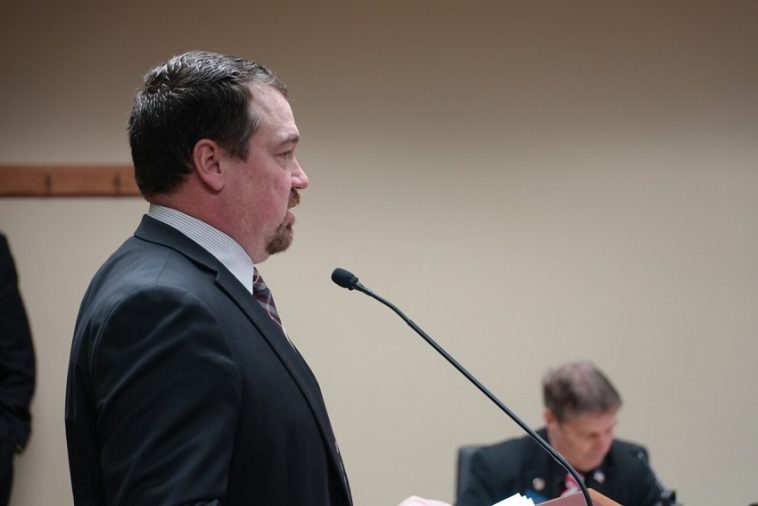Missoula, MT – On Friday morning, a Montana legislative committee took steps to advance a pair of bills aimed at regulating the state’s marijuana industry, including one designed to slow the growth of new dispensaries.
The Senate Business, Labor, and Economic Affairs Committee moved forward with Senate Bill 27, sponsored by Senator Ken Bogner, R-Miles City, and Senate Joint Resolution 5, sponsored by Senator Josh Kassmier, R-Fort Benton. These measures were introduced as part of an effort to address the challenges of the state’s evolving cannabis market.
Montana has been operating under a moratorium on new recreational marijuana businesses since the start of legal sales, with the exception of providers who had been licensed under the state’s medical marijuana system. Initially set to expire in June 2023, the moratorium was extended through June 2025 during the 2023 legislative session.
SB 27 would allow new entrants to obtain licenses once the moratorium ends, but with significant restrictions. New applicants would only be permitted to purchase existing licensed marijuana businesses, rather than opening new dispensaries, growing sites, or manufacturing facilities. The bill would allow new licensed premises to open starting July 1, 2027, which is expected to limit the number of new businesses entering the market in the short term.
According to Governor Greg Gianforte’s 2025 budget proposal, Montana currently has about 1,000 licensed marijuana businesses. Without measures like SB 27 in place, projections suggest that up to 500 additional businesses could open in the near future.
In addition to SB 27, Senate Joint Resolution 5 calls on Congress to pass the SAFE Banking Act, which would provide legal protections for banks that serve state-licensed marijuana businesses. This legislation is seen as vital for the industry, as many cannabis businesses operate primarily in cash due to federal banking restrictions.
Kassmier emphasized the importance of addressing the financial challenges faced by marijuana businesses. “We need to pass this so these businesses aren’t keeping cash on hand – maybe losing cash. This just makes the business cleaner, safer,” he said.
Kate Cholewa of the Montana Cannabis Industry Association echoed the need for banking reform. While some banks have started working with marijuana businesses in Montana, the arrangement often comes with higher costs and federal scrutiny. She pointed out that the SAFE Banking Act is more about ensuring safety for banks in serving cannabis businesses than protecting the businesses themselves.
Jen Hensley, who represents Fidelity Diagnostics Laboratory, one of the few licensed marijuana testing labs in Montana, spoke about the difficulty of entering the lab industry. She explained that the lack of access to commercial lending makes it particularly challenging for such operations to get off the ground.
Senator Steve Daines, a key Republican sponsor of the SAFE Banking Act, continues to advocate for the bill, emphasizing that it would not only benefit cannabis businesses but also improve safety for communities, create jobs, and provide clarity for law enforcement.
The committee also reviewed Senate Bill 74, another piece of legislation introduced by Kassmier. SB 74 focuses on technical changes to the marijuana regulatory system, including adjustments to how businesses calculate taxes. Currently, marijuana businesses must pay taxes on the retail price of their products before any discounts, such as those offered to veterans or seniors. SB 74 would base the tax on the actual sale price, making the system more practical for businesses to implement.
Proponents of SB 74 argue that it would alleviate unnecessary administrative burdens, though a budget analysis estimates it could reduce state marijuana tax revenue by approximately 1%, or around $550,000 to $600,000 per year over the next four years.
Additionally, SB 74 would adjust license fees for producers of marijuana concentrates, moving from a per-location fee structure to one based on production levels. This change is expected to benefit manufacturers that operate multiple facilities, potentially lowering their overall fees.
Pepper Petersen, president and CEO of the Montana Cannabis Guild, urged lawmakers to support SB 74, noting the extensive work put in by the interim committee, industry representatives, and regulators. “We should respect that work and honor the commitment they’ve made to ensure Montana taxpayers get their fair share from this program,” Petersen said.
As these bills move forward in the legislative process, their outcome will have a significant impact on Montana’s growing marijuana industry, balancing the need for regulation with the challenges faced by businesses in a rapidly evolving market.



